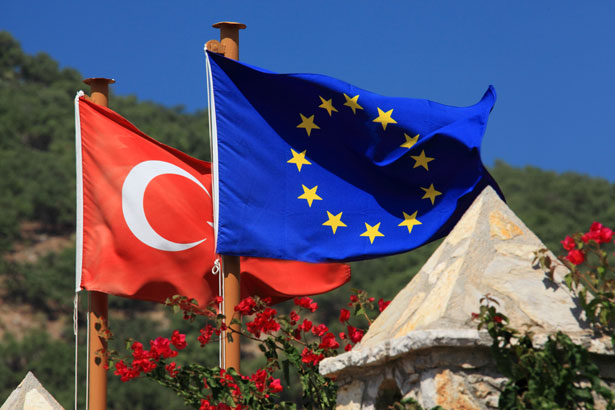
publicdomainpictures.net
First of all, it is necessary to admit that the process itself is carried out with observance of all procedures stipulated in the legislation of Turkey and is quite democratic. Will Turkey become less democratic? The question is what everyone understands by democracy. After the referendum, Turkey will be similar to the United States of America, where the elected president also heads the government. However, no one blames the United States for this.
So why is Europe so worried? There are several reasons, and they primarily in Erdogan’s character. Current president of Turkey is considered quite unpredictable, not too friendly with respect to Europe politician. Was the change in Turkey initiated by another, more convenient to Europe politician, most likely, we would not have heard any criticism. Now Turkey is accused of the fact that the process of its integration into the European Union has almost stopped. But in fact, Europe itself has not figured out whether it wants to initiate this huge (81 million inhabitants) Muslim state, which, moreover, is gradually drifting towards conservative Islam.
One more reproach. Turkey resumed conversations about the possible restoration of the death penalty. This will completely cut off this country's way to Europe. However, it is not audible that Brussels ever reproached the United States for practicing the use of the death penalty there.
Europe is also frightened by possible resumption of the flow of Syrian refugees to the Greek islands, and internal instability in Turkey itself. The referendum’s results have clearly demonstrated that the state is split not only politically, but also on a territorial and national basis. Large western cities, such as Istanbul, Izmir and Ankara, as well as all of the Mediterranean coast, voted against Erdogan’s initiative, but conservative central regions and the Black Sea coast supported him. The population of the country’s south-east also voted against the reform.
Another thing that irritates many of Turkey's neighbors is Erdogan's remarks about restoring the might of the former Ottoman Empire. Under this, at least for the time being, it implies expansion of political, economic, ideological and cultural influence of Turkey. It is unlikely that modern Turkey would try to annex territories of the neighboring countries (for example, the collapsing Syria) in a purely physical way similar to how it was done by Russia and the Crimea.
Nevertheless, it cannot be denied that Turkey's influence in the region has been growing from year to year. Another confirmation of this trend is last week’s statement of President of Kazakhstan Nursultan Nazarbayev about translation of the Kazakh language from Cyrillic to Latin letters. This caused a huge storm in the Russian media, which voiced complaints about withdrawal of Kazakhstan from the "Russian world". Yet, it seems that the Kazakh alphabet’s reform should have been realized long ago, together with Azerbaijan, Uzbekistan and Turkmenistan. The point here is not ideology or politics. Any linguist will say that for the Turkic languages, which also include the Kazakh, Latin alphabet is better than the Slavic Cyrillic alphabet, or the ornate Arabic script. However, at least for Erdogan, this decision of Kazakhstan is another evidence of Turkey’s strength and influence.
source: la.lv
So why is Europe so worried? There are several reasons, and they primarily in Erdogan’s character. Current president of Turkey is considered quite unpredictable, not too friendly with respect to Europe politician. Was the change in Turkey initiated by another, more convenient to Europe politician, most likely, we would not have heard any criticism. Now Turkey is accused of the fact that the process of its integration into the European Union has almost stopped. But in fact, Europe itself has not figured out whether it wants to initiate this huge (81 million inhabitants) Muslim state, which, moreover, is gradually drifting towards conservative Islam.
One more reproach. Turkey resumed conversations about the possible restoration of the death penalty. This will completely cut off this country's way to Europe. However, it is not audible that Brussels ever reproached the United States for practicing the use of the death penalty there.
Europe is also frightened by possible resumption of the flow of Syrian refugees to the Greek islands, and internal instability in Turkey itself. The referendum’s results have clearly demonstrated that the state is split not only politically, but also on a territorial and national basis. Large western cities, such as Istanbul, Izmir and Ankara, as well as all of the Mediterranean coast, voted against Erdogan’s initiative, but conservative central regions and the Black Sea coast supported him. The population of the country’s south-east also voted against the reform.
Another thing that irritates many of Turkey's neighbors is Erdogan's remarks about restoring the might of the former Ottoman Empire. Under this, at least for the time being, it implies expansion of political, economic, ideological and cultural influence of Turkey. It is unlikely that modern Turkey would try to annex territories of the neighboring countries (for example, the collapsing Syria) in a purely physical way similar to how it was done by Russia and the Crimea.
Nevertheless, it cannot be denied that Turkey's influence in the region has been growing from year to year. Another confirmation of this trend is last week’s statement of President of Kazakhstan Nursultan Nazarbayev about translation of the Kazakh language from Cyrillic to Latin letters. This caused a huge storm in the Russian media, which voiced complaints about withdrawal of Kazakhstan from the "Russian world". Yet, it seems that the Kazakh alphabet’s reform should have been realized long ago, together with Azerbaijan, Uzbekistan and Turkmenistan. The point here is not ideology or politics. Any linguist will say that for the Turkic languages, which also include the Kazakh, Latin alphabet is better than the Slavic Cyrillic alphabet, or the ornate Arabic script. However, at least for Erdogan, this decision of Kazakhstan is another evidence of Turkey’s strength and influence.
source: la.lv


















